The horrific terrorism in San Bernardino has revived fears of extremist jihadists operating on American soil. But the American public has been dealing with the issue of terrorism in the name of Islam since 9/11. If we weren’t in the middle of a polarized political season with an unprecedented number of GOP candidates competing to get attention, the discourse—and American public perceptions of Islam and Muslims—would not look all that different from the past few years.
In a poll I conducted between November 4 and 10, 2015—after a reported ISIS bomb brought down a Russian civilian airplane over Egypt but before the Paris and San Bernardino attacks—several trends are clear. Many of the attitudes expressed are outgrowths of the American experience over the past decade and a half.
First, Americans differentiate between the “Muslim people” and the “Muslim religion,” and they view Islam more unfavorably than they do Muslims. This may have many reasons, but at the core, it is probably easier for many Americans—with strong anti-discrimination norms—to express dislike of an abstract idea rather than to appear prejudiced toward people. Even Donald Trump prefaces his anti-Muslim or (anti-Hispanic) rhetoric with “I love Muslims.” It may also be partly a function of familiarity (as my seventh point below suggests).
The contrasting American attitudes on Islam and Muslims have been around for some time, though views of Islam in particular worsened in the months after 9/11. They never recovered, even during the early days of the Arab uprisings, which generated much sympathy among Americans.
Three weeks after 9/11, an ABC News poll found that Americans had a more favorable view of Islam than unfavorable, 47 percent to 39 percent. But a decade later, the picture changed dramatically. A poll I conducted in April 2011 showed that 61 percent of Americans expressed unfavorable views of Islam, while only 33 percent expressed favorable views. This was in the middle of expressed optimism about the Arab uprisings, when 70 percent of Americans, for example, expressed favorable views of Egyptians. At the time, Americans still seemed to differentiate between Islam and Muslims, with half saying they have positive views of Muslims.
My recent poll indicates nearly identical views of Islam in 2015 as in the optimistic days of 2011, with 61 percent of Americans also expressing unfavorable views. But views of the Muslim people slightly improved, with 53 percent expressing favorable views. This comes despite the pessimism about the region, the rise of ISIS, and the bombing that dominated the news even before the Paris and the San Bernardino attacks; After all, 70 percent of Americans identified ISIS as the biggest threat facing the United States a year ago, which is about the same percentage expressing this view in my most recent poll.
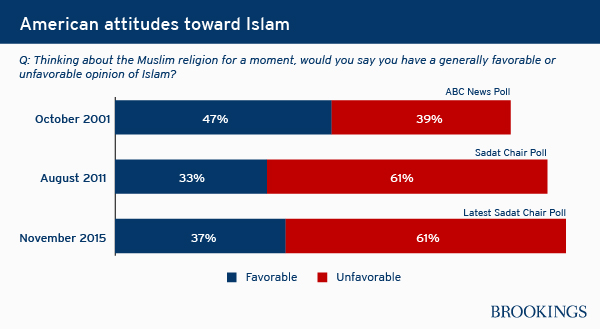 Second, views of both the Muslim people and the Muslim religion are divided across party lines. A large majority of Democrats, 67 percent, have favorable views of Muslims, compared to 41 percent and 43percent for Republicans and Independents respectively. And while a slight majority of Democrats, 51 percent, have a favorable view of the Muslim religion, in contrast, 73 percent of Republicans express unfavorable views of Islam.
Second, views of both the Muslim people and the Muslim religion are divided across party lines. A large majority of Democrats, 67 percent, have favorable views of Muslims, compared to 41 percent and 43percent for Republicans and Independents respectively. And while a slight majority of Democrats, 51 percent, have a favorable view of the Muslim religion, in contrast, 73 percent of Republicans express unfavorable views of Islam.
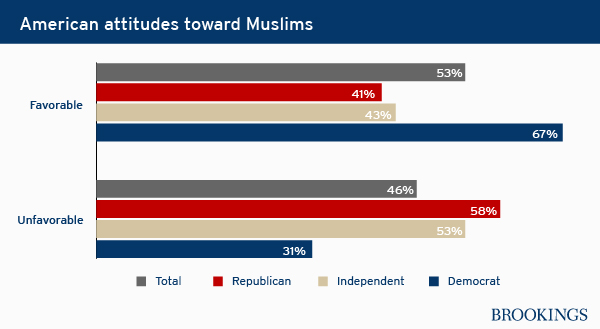 Third, Republicans who express very unfavorable views of Muslims prefer Donald Trump for president (43 percent) in comparison to only 12 percent of Republicans who hold very favorable views of Muslims.
Third, Republicans who express very unfavorable views of Muslims prefer Donald Trump for president (43 percent) in comparison to only 12 percent of Republicans who hold very favorable views of Muslims.
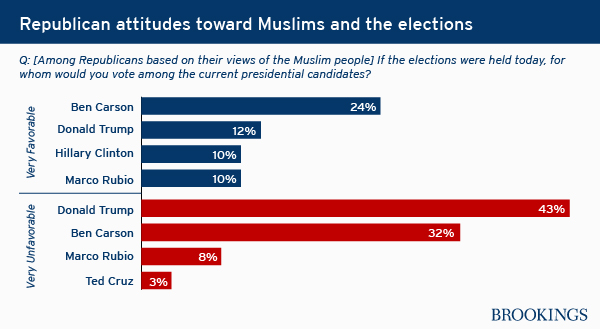 Fourth, Americans generally do not accept that there is a clash of civilizations, but the partisan divide on this issue is particularly large. Only 39 percent of Americans say Western and Islamic religious and social traditions are incompatible, while 57 percent say most people in the West and the Islamic world have similar needs and wants. These results are comparable to the results of a poll I conducted in April 2011, where the breakdown was 37 percent to 59 percent respectively. Party differences cannot be missed: While only 26 percent of Democrats say the two traditions are incompatible in the latest poll, 56 percent of Republicans say the same.
Fourth, Americans generally do not accept that there is a clash of civilizations, but the partisan divide on this issue is particularly large. Only 39 percent of Americans say Western and Islamic religious and social traditions are incompatible, while 57 percent say most people in the West and the Islamic world have similar needs and wants. These results are comparable to the results of a poll I conducted in April 2011, where the breakdown was 37 percent to 59 percent respectively. Party differences cannot be missed: While only 26 percent of Democrats say the two traditions are incompatible in the latest poll, 56 percent of Republicans say the same.
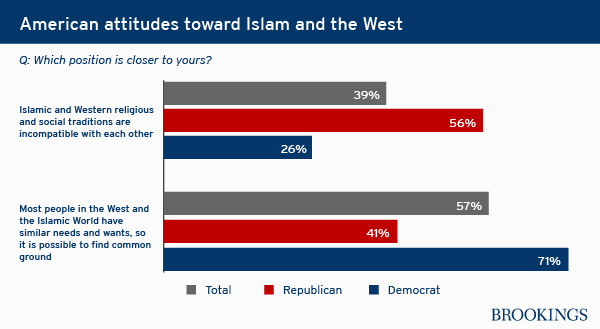 Fifth, demographically, younger people and those with higher education have slightly more favorable views of Islam and Muslims, and particularly reject a clash of civilization thesis. Sixty percent of people aged 18 to 24 have favorable views of Muslims in comparison to only 43 percent of those over 65; this also holds among Republicans, where 65 percent of those 18 to 24 have favorable views in comparison to 32% of those over 65.
Fifth, demographically, younger people and those with higher education have slightly more favorable views of Islam and Muslims, and particularly reject a clash of civilization thesis. Sixty percent of people aged 18 to 24 have favorable views of Muslims in comparison to only 43 percent of those over 65; this also holds among Republicans, where 65 percent of those 18 to 24 have favorable views in comparison to 32% of those over 65.
Forty-nine percent of those with education below high school and 44 percent of those with a high school education hold positive views of Muslims, in comparison to 52 percent of those with some college education and 63 percent of those with college degrees and above.
Sixth, the views of two important American constituencies on Middle East policy, Evangelicals and American Jews, are particularly contrasting. Among those identifying themselves as Jewish Americans (5 percent of the sample), only 20 percent say that Islamic and Western religious and cultural tradition are incompatible. This contrasts with 55 percent of Evangelical Christians. While 43 percent of Jewish Americans have favorable views of Islam (which is slightly higher than the national total of 37 percent), only 18 percent of Evangelicals feel the same. And 55 percent of Jewish Americans express favorable views of Muslims, in contrast to only 38 percent of Evangelicals.
Seventh, majorities of those who know some Muslims—even if not well—have favorable of views of Muslims; this holds across the political spectrum. For example, only 22 percent of Republicans who know no Muslims have favorable views, compared with 51 percent of Republicans who know some Muslims but not well, and 59 percent of those who know some Muslims well.
But knowing some Muslims, even well, does not influence American views of Islam as much. While those who know Muslims have slightly improved views of Islam, still, majorities of Republicans and Independents retain an unfavorable view of the Muslim religion. And even Americans who say they know some Muslims very well are divided down the middle in their attitudes toward the Muslim religion.
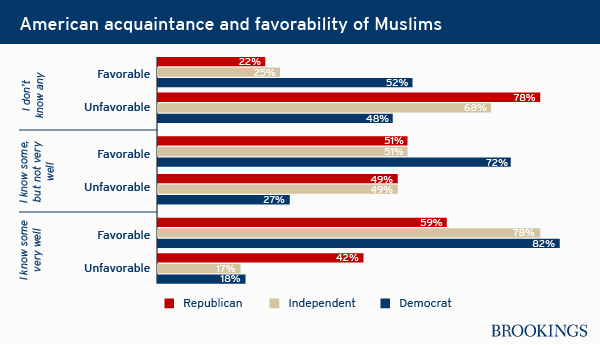
Looking in the mirror
In the end, does it really matter how Americans view Muslims? Enormously—and not just because of policy implications, but also because it inevitably affects the way Muslims see themselves.
Our current debate is of course colored by the breathtaking exaggerations of an unusually intense political season. In the process, we forget that religion and ethnicity are often only small parts—sometimes mere afterthoughts—of how people see themselves. A New York lawyer, Anika Rahman, captured this complexity well in the days after 9/11 when she wrote in the New York Times:
“I am so used to thinking about myself as a New Yorker that it took me a few days to begin to see myself as a stranger might: a Muslim woman, an outsider, perhaps an enemy of the city. Before last week, I had thought of myself as a lawyer, a feminist, a wife, a sister, a friend, a woman on the street.”
It’s a reminder that identity is a relationship. People define themselves in part as a function of how others view them; we are what we have to defend. The worst thing that Americans can do is paint the wrong picture of Muslims—including their own fellow Americans.
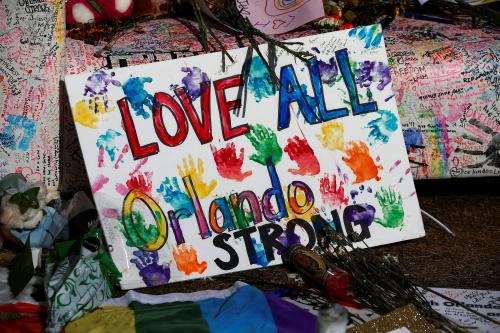
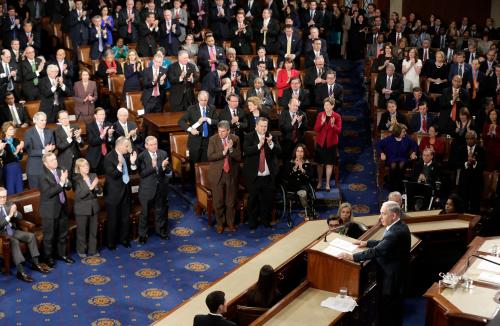
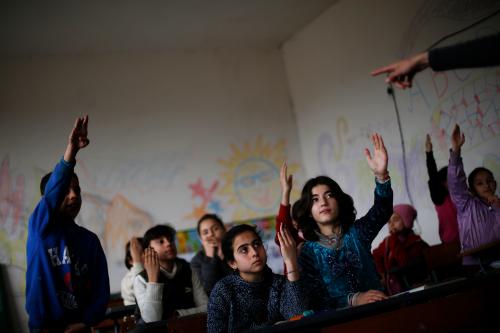

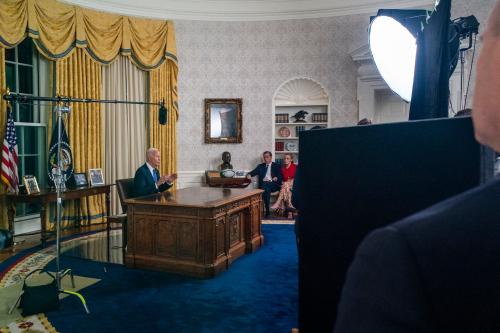
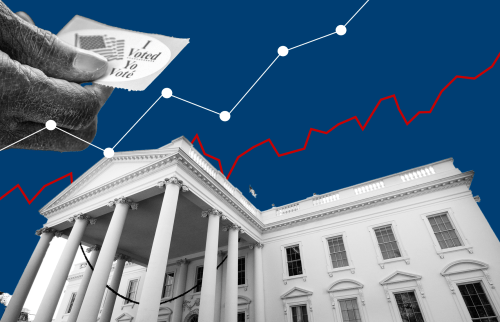
Commentary
What Americans really think about Muslims and Islam
December 9, 2015